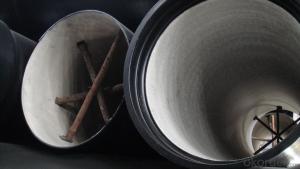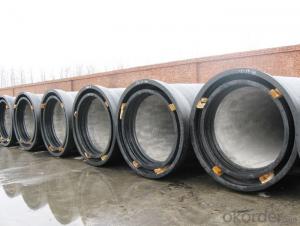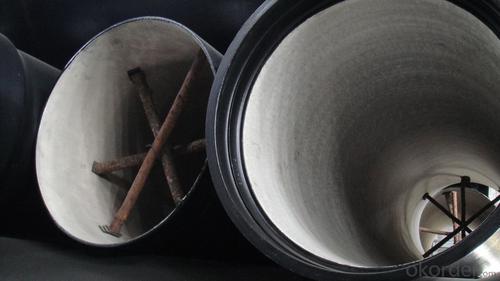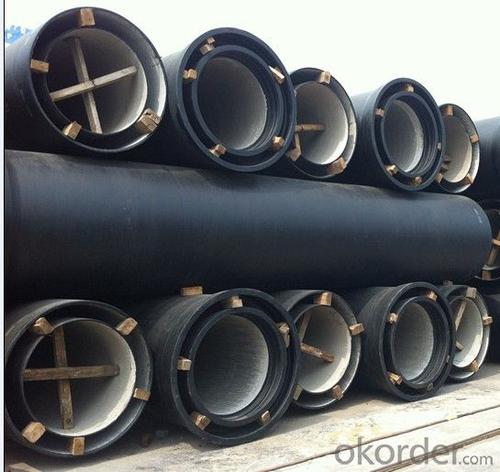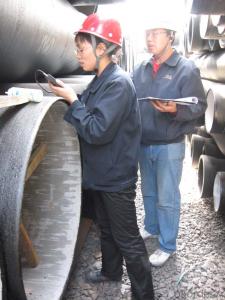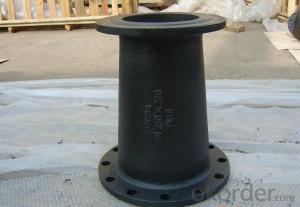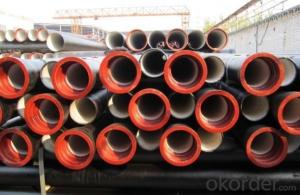Ductile Iron Pipe On Sale Made In China DN300
- Loading Port:
- Tianjin
- Payment Terms:
- TT OR LC
- Min Order Qty:
- 1000 m
- Supply Capability:
- 10000 m/month
OKorder Service Pledge
OKorder Financial Service
You Might Also Like
1.Packaging & Delivery
Packaging Detail: | DN80-300 bundled with steel belt ( the bundle size see the product detail part) DN400-1200 are in bulk |
Delivery Detail: | at least 5days for MOQ |
2.Specifications
Ductile iron pipe comply with ISO2531/EN545
1)We are factory
2)Best quality
3)Competive price
4)On time delivery
3.Features:
Facilitating high resistance to loadings, pressure and vacuum with high tensile strength,
Enabling high resistance to corrosion,
Not requiring cathodic protection,
Less operating cost since cast pipes have larger nominal diameter than polyethylene pipes.
Being the best pipe in case of an earthquake, with its ability of resilience and resistance to impacts without deformation,
Long product life, exceeding 50 years,
Preserving the quality of water with healthy interior coating.
4.Applied Standards:
General Design | ISO 2531 |
Internal Lining | ISO 4179 |
External Coating | ISO 8179 |
Polyethylene Coating (Optional) | ISO 8180 |
5.Joint Types:
Push-on Type | TYT Type |
Standard Type |
6. Diameters:
Pipes | Ø80 – Ø1200 mm (L = 6m, and 5.7m) |
Fittings | Ø80 - Ø2200 mm |
7. Wall Thickness:
Pipes | C and K classes |
Fittings | Class K10 - K12 |
8.Test Pressures:
Pipes | for Ø80 - Ø300 mm | 50 bar / 40 bar |
for Ø350 - Ø600 mm | 40 bar / 30 bar | |
for Ø700 - Ø1000 mm | 32 bar / 25 bar | |
for Ø1100 - Ø2600 mm | 25 bar |
Fittings | for Ø40 - Ø300 mm | 25 bar (*) |
for Ø350 - Ø600 mm | 16 bar | |
for Ø700 - Ø2600 mm | 10 bar | |
(*16 bar for fittings with PN10 flanges) | ||
9.Materials:
Pipe | Ductile iron casting, minimum 420 MPa tensile strength |
Internal Lining | Concrete Lining, ISO 4179 |
Socket Internal 10.Lining | 200 micron epoxy coating |
External Coating | 70 micron bitumen coating on 130 gr/m2 zinc coating, ISO 8179 |
Fittings | Ductile iron casting, minimum 420 MPa tensile strength |
Internal Lining | Concrete Lining, ISO 4179 |
External Coating | 70 micron bitumen coating on 130 gr/m2 zinc coating, ISO 8179 |
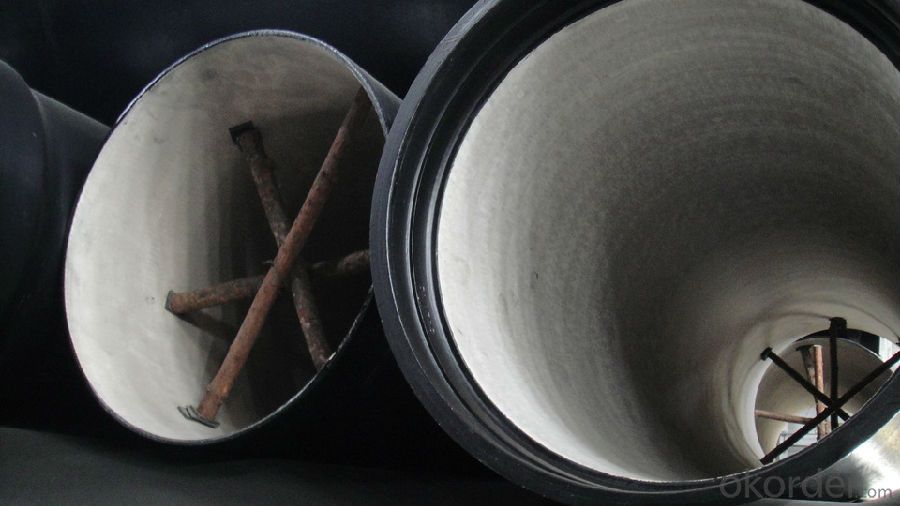
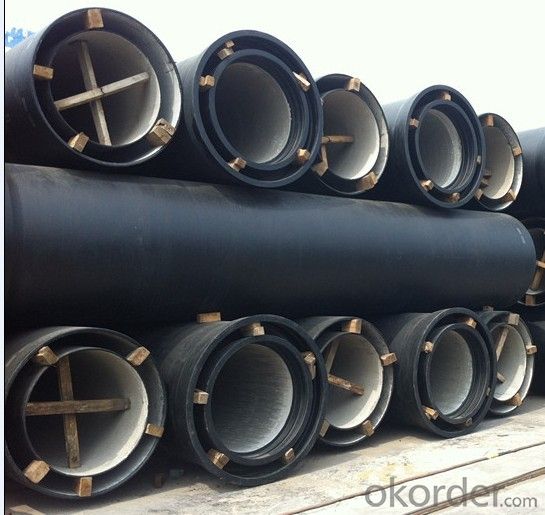
- Q: How does ductile iron pipe perform in extreme temperatures?
- Ductile iron pipe performs well in extreme temperatures due to its ability to expand and contract without cracking or breaking. It has a high thermal conductivity, allowing it to efficiently transfer heat without compromising its structural integrity. Additionally, its corrosion resistance properties make it suitable for both hot and cold environments, ensuring long-term performance even in extreme temperature conditions.
- Q: Are ductile iron pipes suitable for use in paper mills?
- Ductile iron pipes, known for their strength and durability, are well-suited for paper mills. With their excellent performance in various industrial settings, including paper mills, these pipes are able to withstand high-pressure systems and resist corrosion. This makes them suitable for transporting water, chemicals, and other fluids commonly used in paper mills. Moreover, the impact resistance of ductile iron pipes is advantageous in an environment with heavy machinery and equipment. In summary, ductile iron pipes are a dependable and enduring choice for paper mills, thanks to their strength, durability, corrosion resistance, and ability to handle high-pressure systems.
- Q: Steel plastic pipe, ductile iron pipe, steel pipe difference
- The steel plastic pipe, the outer layer is made of steel, the inner cover of organic material, not easy to transport corrosive medium, suitable for delivery of utilities, tap water and toxic corrosive medium, not suitable for high temperature medium, pipe price is high, very difficult to install and manufacturers warranty period is generally 10 years.
- Q: Are ductile iron pipes resistant to UV degradation?
- No, ductile iron pipes are not resistant to UV degradation.
- Q: What are the advantages of using ductile iron pipe?
- Using ductile iron pipe in various applications offers several benefits. Firstly, ductile iron pipe is renowned for its strength and durability. It possesses higher tensile and yield strengths compared to other pipe materials, making it highly resistant to cracking, bending, and breaking. This exceptional strength enables the pipe to withstand high-pressure and heavy-load conditions, making it an ideal choice for applications such as water and sewage systems, oil and gas pipelines, and industrial piping. Secondly, ductile iron pipe exhibits excellent corrosion resistance. It is coated with a protective layer, typically zinc or epoxy, which prevents rusting and corrosion. This coating ensures a longer lifespan for the pipe, even in harsh environments or when transporting corrosive fluids. Another advantage of ductile iron pipe lies in its flexibility. Unlike rigid pipes, ductile iron pipes possess a certain level of flexibility, enabling them to endure ground movements and settle without fracturing. This flexibility proves particularly advantageous in areas prone to earthquakes or soil settlements. Additionally, ductile iron pipe boasts a smooth inner surface, minimizing flow resistance and enhancing fluid transportation efficiency. It also reduces the likelihood of sediment accumulation or corrosion within the pipe, resulting in improved flow rates and decreased maintenance requirements. Furthermore, ductile iron pipe proves cost-effective in the long run. Although it may entail higher initial costs compared to other pipe materials, its durability and minimal maintenance needs make it a cost-effective choice over time. The extended lifespan of ductile iron pipe reduces the necessity for frequent replacements and repairs, contributing to lower overall life-cycle expenses. Lastly, ductile iron pipe exhibits environmental friendliness. It is manufactured using recycled materials, and its extended lifespan diminishes the need for frequent replacements, thereby reducing the carbon footprint associated with manufacturing and transportation. In conclusion, the utilization of ductile iron pipe offers numerous advantages, including exceptional strength, corrosion resistance, flexibility, smooth inner surface, cost-effectiveness, and environmental friendliness. These qualities establish it as a reliable and preferred option for various applications across diverse industries.
- Q: Can ductile iron pipes be used for underground chemical processing systems?
- Due to their limited resistance to corrosion from various chemicals, ductile iron pipes are generally not recommended for use in underground chemical processing systems. Despite being known for their strength, durability, and flexibility, ductile iron pipes can still corrode when exposed to certain chemicals, especially those with high acidity or alkalinity. The use of ductile iron pipes in underground chemical processing systems poses a higher risk of exposure to corrosive substances that can gradually deteriorate the pipes. This deterioration can result in leaks, cracks, and failures in the piping system, compromising its integrity and potentially creating hazardous conditions. To mitigate this risk, it is advisable to consider alternative materials that offer greater resistance to corrosion in underground chemical processing systems. Stainless steel, PVC, and high-density polyethylene (HDPE) pipes are examples of materials that provide superior chemical resistance and can withstand the harsh conditions typically found in chemical processing environments. To determine the most suitable materials for underground chemical processing systems, it is essential to consult experts in chemical engineering, piping design, and corrosion resistance. The proper selection of materials is crucial for ensuring the longevity and safety of the piping infrastructure in such environments.
- Q: What is the minimum operating temperature for ductile iron pipes?
- The minimum operating temperature for ductile iron pipes is typically -40 degrees Celsius. Ductile iron has excellent strength and ductility even in cold temperatures, making it suitable for a wide range of applications, including water and wastewater systems. However, it is important to note that the specific minimum operating temperature can vary depending on factors such as the specific grade of ductile iron used and the application requirements. It is always recommended to consult the manufacturer's specifications and guidelines to ensure proper usage and performance of ductile iron pipes in cold temperatures.
- Q: How to analyze and judge the quality of ductile iron pipe
- The quality of water supply pipe ductile is a topic worthy of discussion, how to judge the quality of the ductile iron pipe, ductile now on the market is all kinds of pipe, a name sand type ductile iron pipe, ductile water-cooling tube, K8 grade K9 grade ductile iron pipe, ductile iron pipe, also the brand is divided into ductile ductile pipe pipe, big brands, and some well-known manufacturers of producing ductile pipe,
- Q: How do ductile iron pipes handle ground settlement due to construction activities?
- Ductile iron pipes have the ability to handle ground settlement caused by construction activities due to their flexibility and strength. These pipes are designed to withstand external pressure and can accommodate minor ground movements without significant damage or failure. The ductility of the material allows the pipes to deform slightly, absorbing the ground settlement and preventing them from cracking or breaking. Additionally, the joints in ductile iron pipes are typically flexible, allowing for further movement and reducing the risk of leakage or structural issues. Overall, ductile iron pipes are well-suited for withstanding ground settlement and ensuring the integrity of the pipeline system during construction activities.
- Q: What is the difference between cast iron pipe and seamless steel pipe and galvanized steel pipe?
- Cast iron pipe: cast pipe made of cast iron. Cast iron pipes are used for water supply, drainage and gas transmission lines. They include cast iron pipes and pipe fittings. Labor intensity is small. According to the casting method, it is divided into continuous cast iron pipe and centrifugal cast iron pipe, in which the centrifugal cast iron pipe is divided into sand mould and metal type two kinds. Divided into gray cast iron pipe and nodular cast iron pipe according to different material. According to the interface form, it is divided into flexible interface, flange interface, self anchored interface, rigid interface and so on. Among them, the flexible iron pipes rubber sealing ring; flange interface cast iron pipe flange fixed in the rubber pad, the flange gasket sealing; rigid interface cast iron pipe socket is large, straight pipe is inserted, sealed with cement, this technology has been basically eliminated.
Send your message to us
Ductile Iron Pipe On Sale Made In China DN300
- Loading Port:
- Tianjin
- Payment Terms:
- TT OR LC
- Min Order Qty:
- 1000 m
- Supply Capability:
- 10000 m/month
OKorder Service Pledge
OKorder Financial Service
Similar products
Hot products
Hot Searches
Related keywords
